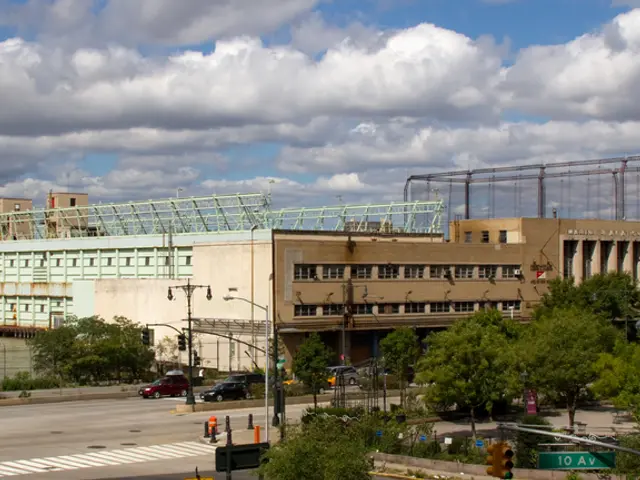The Emergence of AI-Focused Data Centers: The Latest Era of Tech Hubs Placed at Society's Core
In the rapidly evolving digital landscape, data center operator atNorth is leading the charge towards a greener future. At its core, atNorth's data center 'ecosystem' philosophy emphasizes considering the natural environment and community engagement.
As enterprise businesses strive to balance their technological needs with mitigating their environmental impact, atNorth engages in industry associations and organizations like the Climate Neutral Data Center Pact and the United Nation's Global Compact for innovation and sustainability.
Location and design are key factors for responsible data center development, especially for AI-ready data centers. Cooler climates reduce cooling costs and energy consumption, while geographical stability minimizes risks from natural disasters. Recognized standards such as the Uptime Institute Tier Standard, EN 50600, ANSI/TIA 942-B, and ANSI/BICSI 002-2019 ensure redundancy, reliability, cooling, and energy efficiency.
Network connectivity is another crucial aspect. AI workloads require low latency and high bandwidth, which carrier-neutral designs with multiple independent providers and diverse cable routes can provide, enhancing reliability and reducing single points of failure. Direct cloud and internet exchange connections further support AI applications requiring rapid data access.
Sustainability considerations include using renewable energy sources, waste heat reuse, and grid balancing services integrated into design to respond to fluctuations in power supply. Data centers can also contribute positively to local communities by promoting biodiversity initiatives, job creation, and ecosystem thinking, fostering both environmental and social benefits.
Resilience to emergencies and power disruptions through robust backup systems and disaster recovery plans is critical to maintaining uninterrupted service and avoiding environmental risks related to sudden failures in high-density AI infrastructure.
The Nordic region, with its abundance of natural and renewable energy, cool climate, and excellent connectivity, is an ideal location for data center development. Data centers provide employment opportunities and have a positive impact on the local economy by increasing amenities such as restaurants, hotels, and leisure facilities.
AtNorth collaborates with Wa3rm for circular and bio-based operations using waste heat from DEN02 data center in Denmark to grow vegetables. The company also partners with Kesko Corporation to utilize waste heat from FIN02 data center for heating a neighboring store in Finland.
As the demand for high-performance digital infrastructure continues to increase, data centers that show a commitment to environmental responsibility, energy efficiency, and community integration are essential for the long-term sustainability of digital industries and our planet. This commitment is further emphasized by ESG legislation such as CSRD in the EU, which requires mandatory carbon footprint disclosures for data-intensive companies.
Data-intensive businesses should engage with data center operators committed to reducing their carbon footprint and promoting sustainable practices. The EU's InvestAI initiative and the $500bn Stargate project in the US are set to fuel colossal demand for high-performance data centers. A modular design for data centers can promote agility, enabling adaptation to changing hardware and cooling technologies, and facilitate the use of more sustainable materials.
In conclusion, atNorth's approach to data center development underscores the importance of sustainability, community engagement, and responsible practices in the digital industry. By prioritizing these values, atNorth is leading the way towards a greener, more sustainable future for data centers.
[1] [Source] [2] [Source] [3] [Source] [4] [Source]
- AtNorth's focus on the natural environment and community engagement is a significant step towards balancing technological needs with environmental responsibility, in line with industry associations and organizations like the Climate Neutral Data Center Pact and the United Nations' Global Compact.
- Cooler climates and geographical stability, coupled with recognized standards such as Uptime Institute Tier Standard, EN 50600, ANSI/TIA 942-B, and ANSI/BICSI 002-2019, are integral to responsible data center development, particularly for AI-ready data centers.
- Network connectivity, with carrier-neutral designs and direct cloud and internet exchange connections, is essential for AI workloads that require low latency and high bandwidth, promoting both reliability and the scalability required by enterprise businesses.
- Sustainability is enhanced by using renewable energy sources, waste heat reuse, and grid balancing services, while data centers can also contribute positively to local communities by promoting biodiversity, job creation, and ecosystem thinking.
- AtNorth's commitment to environmental responsibility, energy efficiency, and community integration is essential for the long-term sustainability of digital industries, as highlighted by ESG legislation such as CSRD in the EU, which mandates carbon footprint disclosures for data-intensive companies.




